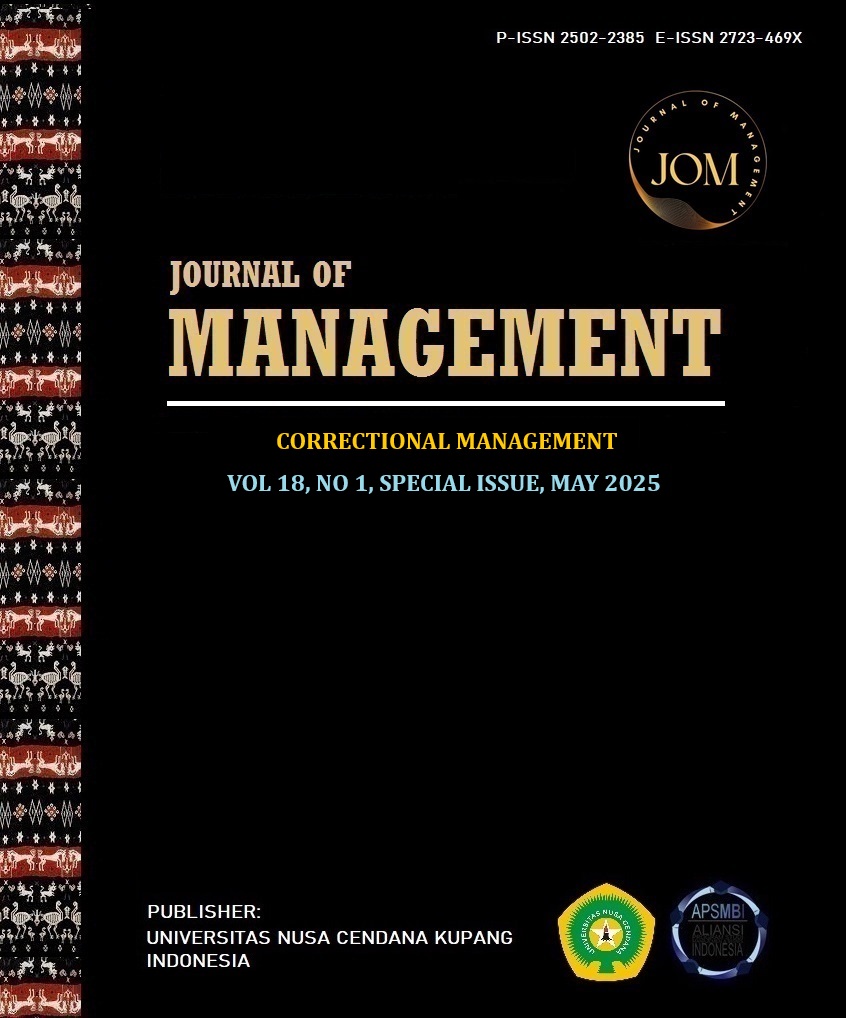MANAGEMENT OF THE DERADICALIZATION PROGRAM FOR TERRORISM CONVICTS IN CLASS I CORRECTIONAL FACILITY SURABAYA
Abstract
The Correctional Institution (Lapas), as a facility for implementing punishment that deprives most of the inmates' rights, should properly consider rehabilitation programs for inmates, including deradicalization programs for terrorism convicts. Therefore, research was conducted on the management of deradicalization programs for terrorism convicts in Lapas to address issues related to deradicalization rehabilitation for these inmates. This research uses a qualitative method with a case study approach at Class I Correctional Institution in Surabaya. The results of the study show that the management of the deradicalization program for terrorism convicts in Lapas generally follows several stages: decision management, program governance, stakeholder engagement, change management, and benefits management. Furthermore, reducing radicalism among terrorism convicts is influenced by several key factors in the deradicalization program's implementation, including social relations, coping, identity, ideology, and action orientation. In the implementation of the deradicalization program, several obstacles were also encountered, including inmates who remain highly radicalized and thus reluctant to cooperate with the Lapas programs, a lack of human resources capable of conducting deradicalization rehabilitation, and sectoral egoism among various parties, which hinders the effective execution of the deradicalization program. Suggestions for improvement include adjusting the placement of high-risk terrorism convicts to Lapas that align with the revitalization of the penitentiary system, providing deradicalization programs and human resource training for the officers if terrorism convicts are present, and enhancing coordination among the program organizers to ensure that the deradicalization process runs as intended.
Keywords : Correctional Institution; Terrorism Prisoners; Deradicalization; Program Management
Downloads
References
Barrelle, K. (2015). Best student paper society for terrorism research annual conference 2014: Pro-integration: disengagement from and life after extremism. Behavioral Sciences of Terrorism and Political Aggression, 7(2), 129–142. https://doi.org/10.1080/19434472.2014.988165
Creswell, J. W., & Creswell, J. D. (2021). Research Design, Qualitative, Quantitative, and Mixed Methods Approaches 5th Edition. In Introducing English Language. https://doi.org/10.4324/9781315707181-60
Horgan, J., Meredith, K., & Papatheodorou, K. (2020). Does Deradicalization Work? Sociology of Crime Law and Deviance, 25, 9–20.
https://doi.org/10.1108/S1521-613620200000025001
Keputusan Menteri Hukumdan Hak Asasi Manusia M.HH-02.PK.01.02.02 Tahun 2017 Tentang Pedoman Kerja Lembaga Pemasyarakatan Khusus Bagi Narapidana High Risk Kategori Teroris
Keputusan Direktur Jenderal Pemasyarakatan PAS-172.PK.01.06.01 Tahun 2015 Tentang Standar Pembinaan Bagi Narapidana Teroris
Keputusan Direktur Jenderal Pemasyarakatan PAS-24.05.02.02 Tahun 2018 Tentang Petunjuk Pelaksanaan Bagi Narapidana Kategori Resiko Tinggi Pada Lembaga Pemasyarakatan Khusus
Koehler, D. (2017). Understanding Deradicalization: Methods, Tools, and Programs for Countering Violent Extremisme.
Kusumarini, M. (2023). Analisis Kebijakan Penanganan Terorisme Terhadap Pemenuhan Hak Asasi Manusia Warga Sipil: Pembelajaran Dan Praktik Baik di Indonesia.
Maskin, E., & Sjostrom, T. (2012). Implementation theory. Computational Complexity: Theory, Techniques, and Applications, 9781461418, 1588–1604. https://doi.org/10.1007/978-1-4614-1800-9_102
Nilsen, P., & Birken, S. A. (2020). Handbook on Implementation Science. In Handbook on Implementation Science. https://doi.org/10.4337/9781788975995
Peraturan Pemerintah Republik Indonesia Nomor 77 Tahun 2019 Tentang Pencegahan Tindak Pidana Terorisme dan Perlindungan Terhadap Penyidik, Penuntut Umum, Hakim, dan Petugas Pemasyarakatan
Peraturan Menteri Hukum dan Hak Asasi Manusia Nomor 35 Tahun 2018 Tentang Revitalisasi Penyelenggaraan Pemasyarakatan
Rachmayanthy, R., Oktaviandi, O., Wibowo, P., & Yuska, S. (2020). Manajemen Strategis Penanganan Tahanan Teroris di Lembaga Pemasyarakatan Kelas 1 Batu Nusakambangan. Society, 8(1), 214–226.
Tampubolon, J. J. (2022). Deradikalisasi Pembinaan Mental Terhadap Mantan Narapidana Terorisme Guna Mengembalikan Ideologi Pancasila Berdasarkan Pasal 43 A Ayat (3) Undang-Undang Nomor 5 Tahun 2018 Tentang Pemberantasan Tindak Pidana Terorisme. New England Journal of Medicine, 372(2), 2499–2508.
Thiry, M. (2016). Program Management. In Revista Brasileira de Linguística Aplicada (Vol. 5, Issue 1).
Undang-Undang Nomor 5 Tahun 2018 Tentang Pemberantasan Tindak Pidana Terorisme
Widya, B. (2020). Deradicalization in Indonesia : Implementation and Challenge. Journal of Terrorism Studies, 2(1). https://doi.org/10.7454/jts.v2i1.1016
Yuliyanto, Y., Michael, D., & Utami, P. N. (2021). Deradikalisasi Narapidana Teroris melalui Individual Treatment. Jurnal HAM, 12(2), 193.
https://doi.org/10.30641/ham.2021.12.193-208

 Muhammad Rizky Nabilla Rahfal(1*)
Muhammad Rizky Nabilla Rahfal(1*)



